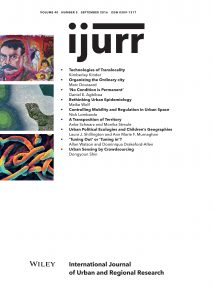How should we understand the relationship between urban environments and infectious diseases? This article addresses this question from three particular perspectives: that of the materialities of health, that of nature and that of networks. The first perspective analytically blends biological dynamics, environmental influence and social practice. The second perspective, mainly influenced by multispecies ethnographies, foregrounds the liveliness and unboundedness of cities. Finally, the third perspective analyses how health is drawn into the domain of security. The article argues that while globalization and urbanization are often discussed as having triggered the emergence and spread of pathogens, urban epidemics are not self-evident and ‘natural’ consequences of these pro-cesses. They do not fall neatly into universal categories of space, modernity or risk; rather, they are produced and shaped by a range of social, political, biological and economic sites and scales. Accordingly, the emergence of pathogens depends on its articulation through specific analytical frameworks. This article suggests that a critical focus on how infectious diseases manifest themselves differently in different local contexts may not only provide insights into the manifold forms of urban life, but also into the multiple, complex and highly political constitution of health.

